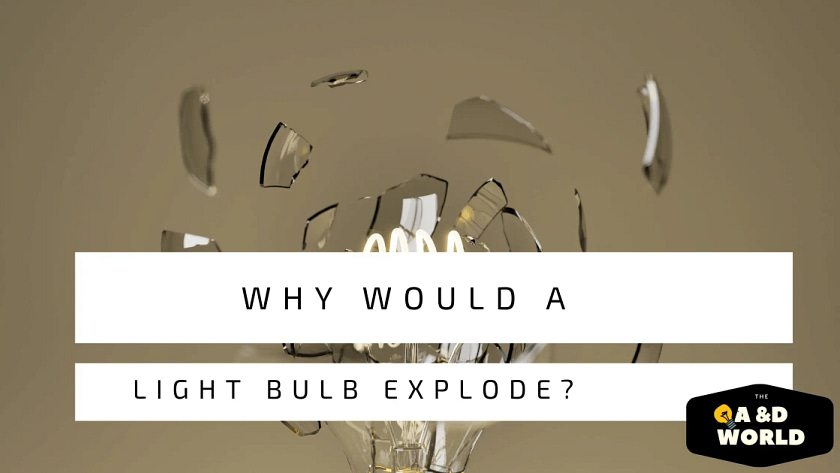Light bulbs may be an essential part of your home, but they are sometimes unpredictable. The fear of exploding light bulbs is common when replacing old bulbs. The chances of your light bulb exploding to pieces are very slim. But it does happen.
Therefore, it is important to understand why your light bulb exploded so you can prevent it from happening in the future.
Light bulbs can explode for a variety of reasons. The most common cause is that your light bulb gets too hot, and the filament burns out.
Another reason is a loose connection between the bulb and the socket. This causes the electricity to bounce off the contact instead of flowing through it.
A word of warning: if you have halogen or incandescent light bulbs in your home, be careful when handling them. If a light bulb breaks, do not touch the fragments and do not let anyone handle them until they are properly disposed of.
Why Light Bulbs Explode?
Incompatible Bulb Wattage
Believe it or not, different types of light bulbs are suitable for different light sources! If you put the wrong bulb in your light fixture, it can overheat and explode.
It is also important that you use the correct wattage for your light fixture. If you use a higher wattage than recommended, the lamp may overheat or, in the worst case, explode.
Cheap Bulbs
Light bulbs made from cheap parts can explode very easily. Usually, these bulbs have poor heat distribution and become weaker and more brittle with age.
When a light bulb reaches its maximum temperature and maintains that temperature for an extended period of time, it can overheat and explode. This is particularly common with incandescent bulbs, as they consume much more power than LED or fluorescent bulbs do.
Expose To Vibration
When bulbs are exposed to excessive levels of vibration, the vibration can cause the components to rub against each other and wear down over time. Eventually, this friction can cause an explosion due to a short circuit or heat buildup within the bulb.
Oils On Your Hands
Many people have heard horror stories about light bulbs exploding, but few are aware of the cause. Products containing oil can cause halogen and incandescent bulbs to explode because they have higher temperatures than LEDs.
Therefore, wear gloves to prevent the oils in your hand from destroying the integrity of the bulb. Many major bulb manufacturers require gloves during and after the installation as a precautionary measure.
Ways To Prevent Your Light Bulbs From Exploding
- Use gloves when changing and installing halogen or incandescent bulbs.
- Purchase durable bulbs.
- Do not use bulbs that are higher than your fixture wattage.
- Tighten the bulbs to the fixture.
Can LED Light Bulbs Explode?
When it comes to light bulbs, people are becoming more conscious of the type of bulbs they buy and how long they last. However, some consumers are still unsure about the safety of LED bulbs and whether or not LEDs can explode.
LED bulbs degrade over time just like any other light bulb – the difference is that LED degrades much more slowly than other types of light bulbs. Also, when LED bulbs eventually fail, it is much less quickly than with incandescent, fluorescent, or halogen bulbs.
That said: sometimes an LED bulb can explode. But these are rare cases where overheating or power surges come into play. LEDs use most of the heat they produce, which reduces the chances of overheating.
Any light bulb can fail catastrophically-it’s just that LED bulbs do so at a much lower rate than traditional bulbs.
Can An Exploding Light Bulb Cause A Fire?
As mentioned above, overheating is a common reason for light bulbs exploding. If a light bulb cannot properly dissipate its heat, it can cause a fire. But again, a fire caused by incandescent bulbs is rare. Lights with poor wiring or a bulb that exceeds the required wattage can cause a fire.
Traditional light bulbs in enclosed spaces such as interior walls or ceilings can cause a fire. Since these lights generate a lot of heat, they can melt the wiring and damage the bulbs. Therefore, installing LED IP-rated bulbs can sufficiently reduce the risk of fire.





